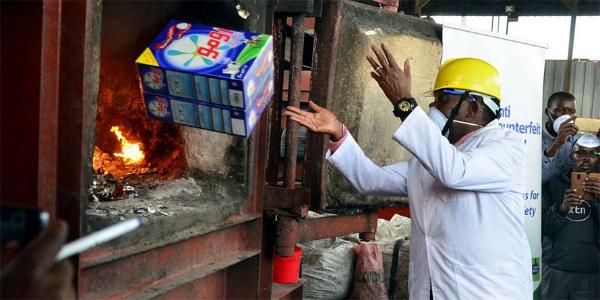Kenyan manufacturers are pushing the State to fast-track proposed changes to the law to give more powers to the Anti-Counterfeit Agency (ACA) in the elevated war on counterfeit menace.
The Presidency has since May taken leadership in the fight against trade in illicit goods, confiscating contraband goods worth billions of shillings that were later destroyed.
President Uhuru Kenyatta on August 31, for instance, destroyed contraband products worth Sh1.5 billion at State-owned East African Portland Cement’s grounds.
The Kenya Association of Manufacturers (KAM), a lobby, says the presidential intervention, through the Deputy Head of Civil Service Wanyama Musiambo, has helped build capacity and create public awareness in the fight against the menace.
But to sustainably combat the stubbornly rising dealings in the shadow economy, KAM wants proposed changes to the Anti-Counterfeit Act, 2008, enacted to, among other changes, give ACA inspectors investigatory powers.
“Counterfeits and illicit trade diminish our efforts to achieve the Big four plan as a country because every pillar of the agenda is gravely affected and inundated with counterfeits and criminal networks,” KAM chairman Sanchen Gudka said via email.
“It is high time we extinguish these activities as they imperil our economic development, governance structures, national security and supply chain integrity.”
Estimates on the actual cost of counterfeits, which accounts for the portion of illicit dealings, range from Sh50 billion to Sh200 billion in potential revenue to government every year.
That affects implementation of development projects, slows down economic growth and hurts creation of new job opportunities for the rising unemployed graduate youth.
KAM said trade in counterfeits has chewed up about 40 per cent market of genuine products.
An estimated 70 per cent of counterfeits are imports, Mr Gudka said, the bulk of which are sourced from China and India where low cost of production has encouraged bulk manufacturing.Eveready East Africa, which shut its dry cell production plant in Nakuru in September 2014, is a classic example of a manufacturer, fell by the counterfeit menace, draining about 100 job opportunities.Sameer Africa also closed down its Yana Tires plant along Mombasa Road, largely due to counterfeit and cheap imports from China and India on top of high operating costs partly driven by inefficiencies.Electronics such as mobile phones and television sets, car spare parts and office stationery are some of the fast moving consumer goods, which are widely mimicked by unscrupulous manufacturers in the country.Others are pharmaceutical products and farm inputs such as fertiliser, according to KAM.ACA, the […]
